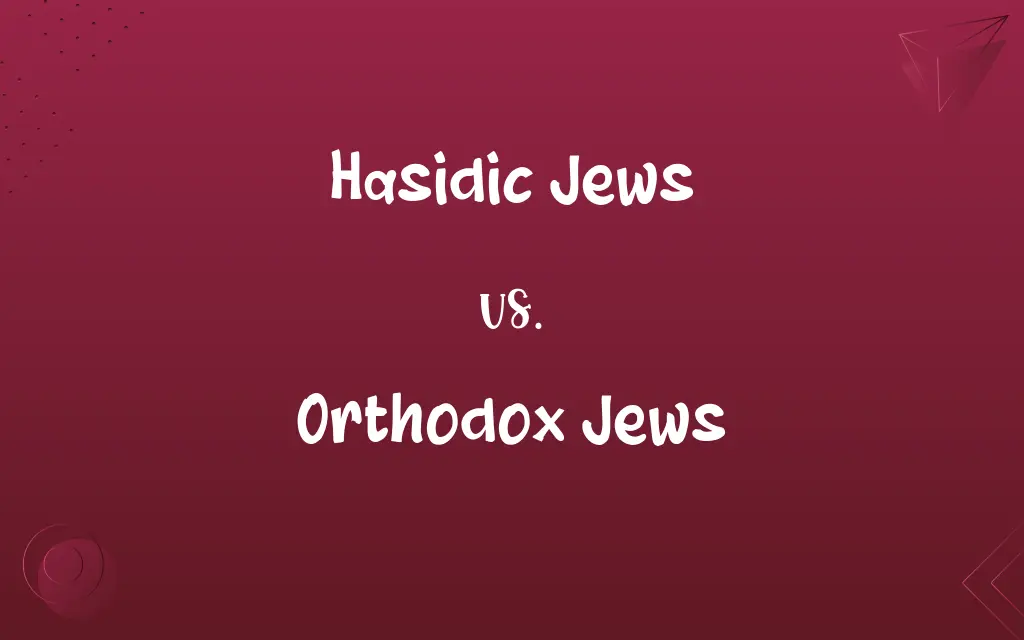Hasidic Jews vs. Orthodox Jews: Know the Difference

By Shumaila Saeed || Published on February 19, 2024
Hasidic Jews are a mystical, community-focused subset of Orthodox Judaism, which encompasses a broader range of traditional Jewish practices and beliefs.

Key Differences
Hasidic Jews represent a mystical, enthusiastic movement within Orthodox Judaism, originating in the 18th century in Eastern Europe. Orthodox Jews adhere to traditional Jewish law and practices, but not all practice the mystical and charismatic elements typical of Hasidism. Hasidism emphasizes a joyful, emotional approach to Jewish practice and belief, often centered around a charismatic leader known as a Rebbe. In contrast, Orthodox Jews may follow a more scholarly and ritual-focused approach to Judaism, with varying levels of emotional expression.
Shumaila Saeed
Feb 19, 2024
The dress and lifestyle of Hasidic Jews are often distinctive, with men typically wearing long black coats, hats, and, in many communities, long sidecurls or payot. Orthodox Jews also adhere to traditional dress codes, which can vary but generally include modest attire; however, the specific styles of Hasidic dress are not universally adopted among all Orthodox Jews. Hasidic communities are often insular, focusing on maintaining a traditional lifestyle and Yiddish language, while Orthodox Jews can range from modern to traditional, with more diverse interactions with secular society.
Shumaila Saeed
Feb 19, 2024
Hasidic Judaism places a strong emphasis on the role of the Rebbe, a spiritual leader who is often believed to have a special connection to God. Orthodox Judaism, while valuing rabbinic leadership, does not typically elevate a single leader to the same spiritual status as a Hasidic Rebbe. The Rebbe's guidance in Hasidic communities extends beyond religious matters to include personal and communal issues, whereas in Orthodox Judaism, rabbinic authority is more focused on religious law and practice.
Shumaila Saeed
Feb 19, 2024
The teachings of Hasidism focus heavily on the inner spiritual life and the mystical aspects of faith, seeking to experience a close, personal relationship with God. Orthodox Judaism, while also valuing spirituality, places a stronger emphasis on halakhic (Jewish law) observance and study of traditional texts. Hasidic practices include joyous praying, singing, and dancing, seen as ways to connect with God, contrasting with the more reserved and formal prayer services often found in Orthodox Jewish settings.
Shumaila Saeed
Feb 19, 2024
In Hasidic communities, there is often a strong emphasis on the teachings and stories of the movement's founders and subsequent leaders. In Orthodox Judaism, while the teachings of various rabbis and sages are respected, there is a broader focus on the Talmud and other classical Jewish texts. The Hasidic approach to Torah study may include mystical interpretations and storytelling, whereas Orthodox study tends to emphasize legalistic and analytical approaches.
Shumaila Saeed
Feb 19, 2024
ADVERTISEMENT
Comparison Chart
Spiritual Leadership
Follow a Rebbe, a dynastic spiritual leader.
Led by rabbis or communal leaders, no specific dynasty.
Shumaila Saeed
Feb 19, 2024
Dress Code
Distinctive dress, like long black coats and hats.
Diverse dress codes, all adhering to modesty standards.
Shumaila Saeed
Feb 19, 2024
Mysticism
Strong emphasis on mysticism and spirituality.
Varies; some focus more on legalistic aspects of Judaism.
Shumaila Saeed
Feb 19, 2024
Community Structure
Tight-knit communities centered around a Rebbe.
Diverse communities with varying degrees of tightness.
Shumaila Saeed
Feb 19, 2024
Religious Expression
Joyous, ecstatic worship is common.
Range from more solemn to joyous practices in worship.
Shumaila Saeed
Feb 19, 2024
ADVERTISEMENT
Hasidic Jews and Orthodox Jews Definitions
Hasidic Jews
Hasidic Jews emphasize heartfelt prayer and a personal relationship with God.
Hasidic Jews engage in long hours of fervent prayer, seeking a deep connection with the divine.
Shumaila Saeed
Jan 19, 2024
Orthodox Jews
Orthodox Jews uphold traditional gender roles and family structures.
In many Orthodox communities, men and women have distinct roles in religious and community life.
Shumaila Saeed
Jan 19, 2024
Hasidic Jews
Hasidic Jews follow a lifestyle that integrates spiritual mindfulness into daily activities.
Hasidic teachings encourage finding holiness in every aspect of daily life.
Shumaila Saeed
Jan 19, 2024
Orthodox Jews
Orthodox Jews encompass a range of communities, from Modern Orthodox to more traditional groups.
Modern Orthodox Jews often engage actively with the secular world while adhering to Jewish law.
Shumaila Saeed
Jan 19, 2024
Hasidic Jews
Hasidic Jews are characterized by their distinctive dress and devotion to a Rebbe.
In Hasidic communities, the Rebbe's guidance is often sought for both spiritual and worldly matters.
Shumaila Saeed
Jan 19, 2024
ADVERTISEMENT
Orthodox Jews
Orthodox Jews maintain a commitment to the study and observance of the Torah and Talmud.
In Orthodox communities, daily study of religious texts is a common practice.
Shumaila Saeed
Jan 19, 2024
Hasidic Jews
Hasidic Jews belong to a movement within Orthodox Judaism known for its mystical and ecstatic spiritual practices.
Hasidic Jews often celebrate Jewish festivals with great enthusiasm and communal joy.
Shumaila Saeed
Jan 19, 2024
Orthodox Jews
Orthodox Jews adhere strictly to traditional Jewish law and customs.
Orthodox Jews observe the Sabbath from sunset on Friday to nightfall on Saturday.
Shumaila Saeed
Jan 19, 2024
Hasidic Jews
Hasidic Jews often live in close-knit communities that center around their spiritual practices.
Hasidic neighborhoods are known for their strong sense of community and shared religious life.
Shumaila Saeed
Jan 19, 2024
Orthodox Jews
Orthodox Jews prioritize ritual observance and maintaining a lifestyle in accordance with Halacha.
Orthodox Jews follow dietary laws, keeping kosher in their homes and eating habits.
Shumaila Saeed
Jan 19, 2024
Repeatedly Asked Queries
What is Hasidic Judaism?
Hasidic Judaism is a spiritual branch within Orthodox Judaism, known for its mysticism and joyous religious practice.
Shumaila Saeed
Feb 19, 2024
What is the role of a Rebbe in Hasidic Judaism?
A Rebbe is a spiritual leader and guide in Hasidic communities, often seen as a conduit to the divine.
Shumaila Saeed
Feb 19, 2024
What are the main beliefs of Orthodox Jews?
Orthodox Jews believe in the divine origin of the Torah and the importance of following Jewish law (Halacha).
Shumaila Saeed
Feb 19, 2024
Can Orthodox Jews drive cars?
Orthodox Jews can drive cars, but not on the Sabbath or Jewish holidays.
Shumaila Saeed
Feb 19, 2024
Do all Orthodox Jews dress like Hasidic Jews?
No, Hasidic Jews have distinctive dress codes, while other Orthodox Jews may dress differently while still adhering to modesty.
Shumaila Saeed
Feb 19, 2024
How do Orthodox Jews view modern technology?
Orthodox Jews use technology, but with considerations for religious laws and customs.
Shumaila Saeed
Feb 19, 2024
What language do Hasidic Jews speak?
Many Hasidic Jews speak Yiddish, alongside the local language of their country.
Shumaila Saeed
Feb 19, 2024
Who are Orthodox Jews?
Orthodox Jews are those who adhere to traditional Jewish law and customs, with a range of expressions and communities.
Shumaila Saeed
Feb 19, 2024
How do Hasidic Jews differ in worship from other Orthodox Jews?
Hasidic Jews often emphasize ecstatic and heartfelt prayer, while other Orthodox Jews may have more subdued styles of worship.
Shumaila Saeed
Feb 19, 2024
Do Orthodox Jews celebrate secular holidays?
Orthodox Jews generally do not celebrate secular holidays, focusing on Jewish religious observances.
Shumaila Saeed
Feb 19, 2024
What are the major holidays celebrated by Hasidic Jews?
Hasidic Jews celebrate all major Jewish holidays, including Passover, Sukkot, and Hanukkah, often with particular fervor.
Shumaila Saeed
Feb 19, 2024
Do Hasidic Jews engage with secular society?
Hasidic Jews often lead insular lives, focusing on their communities, though interaction with secular society varies.
Shumaila Saeed
Feb 19, 2024
Do Orthodox Jews believe in Jesus?
Orthodox Jews do not believe in Jesus as the Messiah or a divine figure, adhering strictly to Jewish teachings.
Shumaila Saeed
Feb 19, 2024
How do Orthodox Jews handle dietary laws?
Orthodox Jews strictly follow kosher dietary laws, which involve specific rules about food preparation and consumption.
Shumaila Saeed
Feb 19, 2024
How do Orthodox Jews view interfaith relationships?
Orthodox Jews generally discourage interfaith relationships, emphasizing marriage within the faith.
Shumaila Saeed
Feb 19, 2024
Are women rabbis accepted in Orthodox Judaism?
Orthodox Judaism traditionally does not ordain women as rabbis, though some modern Orthodox circles are more open.
Shumaila Saeed
Feb 19, 2024
What is the significance of the Sabbath for Hasidic Jews?
The Sabbath is a holy day of rest and spiritual rejuvenation, observed with particular joy in Hasidic communities.
Shumaila Saeed
Feb 19, 2024
What are the educational practices in Hasidic communities?
Education in Hasidic communities focuses heavily on religious studies, often with separate schooling for boys and girls.
Shumaila Saeed
Feb 19, 2024
What is a typical Hasidic family like?
Hasidic families often have many children, with strong emphasis on religious education and community life.
Shumaila Saeed
Feb 19, 2024
How do Hasidic Jews view secular education?
Hasidic Jews often prioritize religious education, with varying degrees of engagement with secular education.
Shumaila Saeed
Feb 19, 2024
Share this page
Link for your blog / website
HTML
Link to share via messenger
About Author
Written by
Shumaila SaeedShumaila Saeed, an expert content creator with 6 years of experience, specializes in distilling complex topics into easily digestible comparisons, shining a light on the nuances that both inform and educate readers with clarity and accuracy.








































































